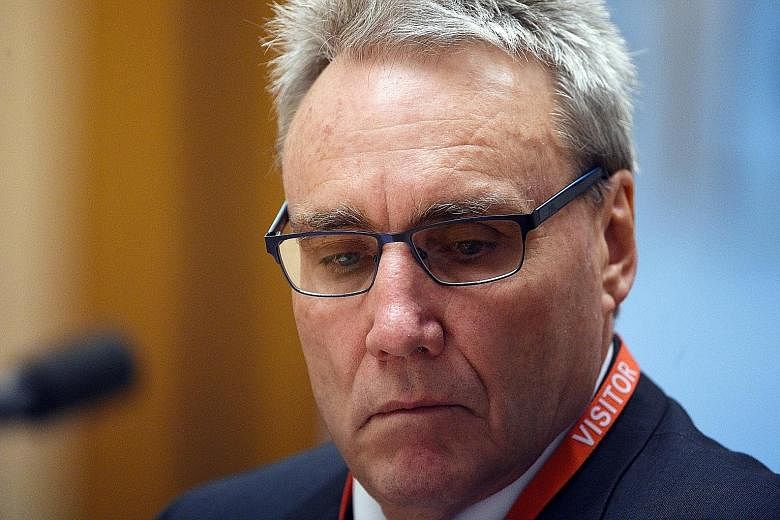Australia has long been considered one of the world's least corrupt countries but its reputation has been slipping amid a series of scandals involving high-profile MPs and public servants.
The well-known figures caught up in scandals last year include senior tax official Michael Cranston, charged as part of an alleged tax fraud syndicate run by his son. There was also prominent Labor MP Sam Dastyari, who quit after accepting donations from a mogul with links to the Chinese Communist Party and then espousing a pro-China position on the territorial dispute in the South China Sea.
In addition, numerous MPs have been caught abusing expenses or wasting money. This includes Ms Sussan Ley, who resigned as health minister last year over claims of misusing travel expenses, including purchasing a property on the Gold Coast while on a taxpayer-funded trip. These scandals, along with concerns about the access of lobbyists and donors to politicians and their staff, have prompted growing calls to create a federal anti-corruption watchdog. The agency, similar to those that exist at a state level, would be independent and have an investigatory role.
Calls for such an agency have come from opposition parties, political commentators and Transparency International, a global anti-corruption organisation.
But the Conservative government of Prime Minister Malcolm Turnbull has resisted the move, saying the current system is working.
"We have numerous Senate inquiries to make sure we can flesh out issues that are of concern to the Australian people," Deputy Prime Minister Barnaby Joyce told reporters last month.
According to the most recent corruption index for 2016, compiled by Transparency International, Australia was the world's 13th least corrupt nation. The least corrupt were Denmark and New Zealand. Singapore was in seventh place, the only Asian nation in the top 10 least corrupt countries. But Australia, long in the top 10, has slipped in recent years. In the organisation's first survey in 1995, it was in seventh place.
Transparency International Australia's head Serena Lillywhite said there was growing mistrust of government in the country and a federal corruption watchdog was "long overdue". She noted the "revolving doors" system in which former senior political staff or MPs lobby politicians on behalf of firms in sectors such as mining, where lucrative government contracts are at stake.
"We've seen a number of scandals over a number of years including most recently the parliamentary expense scandal, concerns with regard to inappropriate foreign political donations and the ongoing issue of industry influence," she told ABC Radio on Jan 30.
"We need to ensure that we have an effective institution that is going to actually prevent, detect, expose and then remedy official corruption at all levels of government."
Opinion polls show overwhelming public support for the creation of a federal corruption agency.
-
YAY OR NAY
- A poll showing overwhelming support for a federal corruption agency82%Support the move7%Oppose11%Undecided
A ReachTEL survey last year found 82 per cent of people supported the move, with 7 per cent opposed and 11 per cent undecided.
Australian states all have anti-corruption bodies which have largely proven effective. The New South Wales agency, the Independent Commission Against Corruption, was created 30 years ago and has led to the downfall of two state leaders as well as countless MPs and ministers accused of corruption. It has also exposed frauds and bribes to officials and politicians in the property and mining sectors.
At a federal level, however, there is no such agency. The federal government instead relies on numerous agencies, such as the Australian Federal Police and the Australian Public Service Commission, which have varied roles in investigating crime or promoting integrity in the public service. But critics say the work of these agencies is piecemeal and they do not provide a standing unified watch against graft .
The opposition Labor Party, which is well ahead in opinion polls, last month announced that it supported the creation of a federal anti-graft agency with search and surveillance powers and able to compel witnesses to testify.
Labor leader Bill Shorten said the agency would be called the National Integrity Commission and would cost about A$58 million (S$60 million) over four years. It would look at corruption by politicians, public servants and judges and their dealings with businesses and individuals, and would be able to refer any alleged crimes to federal prosecutors.
"I want it to be a clear, concrete and impartial mechanism, to help restore trust, accountability and transparency in the Commonwealth sector," Mr Shorten said.
Mr Turnbull told Fairfax Media late last year he had no plans for such an agency. But, in comments seen as suggesting he may eventually change his mind, he added: "The policy objective is zero tolerance, I take that very seriously."


